Teaching our children how to do daily chores is hugely beneficial. However, training young children to do basic chores can feel overwhelming to busy parents. If that’s you, let me assure you that a family chore system is both worthwhile and attainable. In this post I’ll share why it’s worth it, and how to do it, step by step. I also include links to several family chore chart free printables.
@dinkumtribe #chores can make #kids smarter! Here’s 4 ways. #lifeadvice #didyouknow #dinkumtribe_lifehacks ♬ original sound – dinkumtribe
Table of Contents
Avoiding the hard stuff
So we often talk ourselves out of teaching our kids chores: “It’s easier to just do it all myself.” “The kids complain any time I ask them to help out.” “The job won’t get done properly.”
I’ve used all of these reasons to avoid setting up a family chore chart.
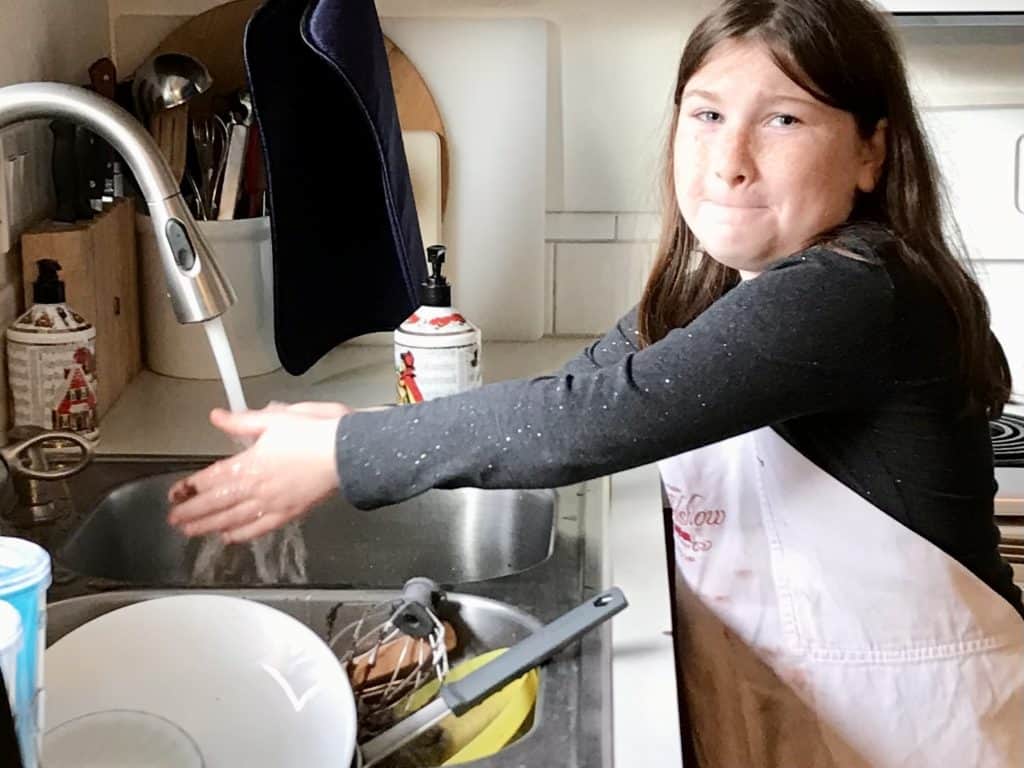
True story: I did not try to start teaching my children chores in a systematic way until my oldest was six and we had 4 children. By that point I was overwhelmed by keeping up with everything while homeschooling.
Here’s 4 reasons why it’s worth it to set up a family chore chart.
Reason 1: Parents need help!
And I mean that in the nicest way possible! Modern parents are typically wearing several hats: wage-earner, parent, spouse, housekeeper, cook, volunteer, adult child, sibling, friend, to name a few. You’ll burn out if you try to do it all yourself!

Even if your spouse helps out, it’s typical for one spouse to carry the bulk of the home tasks. Having your kids help with weekly chores is a great way to give both parents more free time and energy to spend doing fun things as an entire family.
Reason 2: Better self-esteem
Kids of all ages want to know that they’re a valued family member. I observed that from an early age, my young children began to imitate Mom, Dad, or older kids in doing simple tasks.
Kids also need that sense of accomplishment that comes from doing a good job. When kids have a daily routine for chores and specific tasks they are responsible for, they learn firsthand the value of hard work.
When we fail to teach kids these basic life skills, they grow up feeling incompetent and insecure in their family.

Reason 3: Stronger family relationships
Working on chores together can improve sibling relationships. It’s a good way to practice conflict resolution and teamwork in a safe space with people who love us.
We’ve seen amazing growth in our children’s relationships as a direct result of doing chores together. Yes, it takes more parental involvement, but eventually they learn how to work together for the benefit of the family.
Reason 4: Stability in times of change
Our chore system saved our sanity when we moved to a new house in April 2021! Since everyone already knew how to do some chores, my kids and husband handled laundry, kitchen cleanup, and basic sanitation. That way I could just focus on getting us settled, giving me time to unpack, reorganize, cook, and do other things.
I also found this to be the case during my last two pregnancies. I was nauseated for the first four months and could hardly do anything except sit and feel awful. Brian and the children were able to keep things going relatively smoothly with little input from me because our family’s weekly chore chart was a habit.

In the next section, my husband Brian goes into further detail on the benefits of chores for children.
The Benefits of Chores for Kids (as told by Dad)
So you’ve heard my wife’s reasons for investing in a well-built household chore system. Here’s a few things to consider from a dad’s perspective:
Reason One: Chores Educate
When we train our children in age-appropriate chores we allow them to learn new concepts and skills. Practice, follow-through, and results make for an increase in their spiritual/mental, emotional, and physical development. Simply put, doing chores makes for smarter kids because it schools them even when the school day is done.
Reason Two: Chores Inform

Experience is a powerful teacher and chores make for lots of experience, and with it, a sense of responsibility. Here’s a fun example that explains what I mean.
Our new home came with a grown-up, low-maintenance backyard, which is a nice way of saying it has no grass and way too much river rock and gravel. We let our boys play freely with the rocks and gravel, as long as rocks aren’t flying at each other or the house.
However, in our recent chore chart update one of our younger children was assigned to clean the patio and walkway weekly. Almost magically, the gravel and river rock have mostly stayed put!
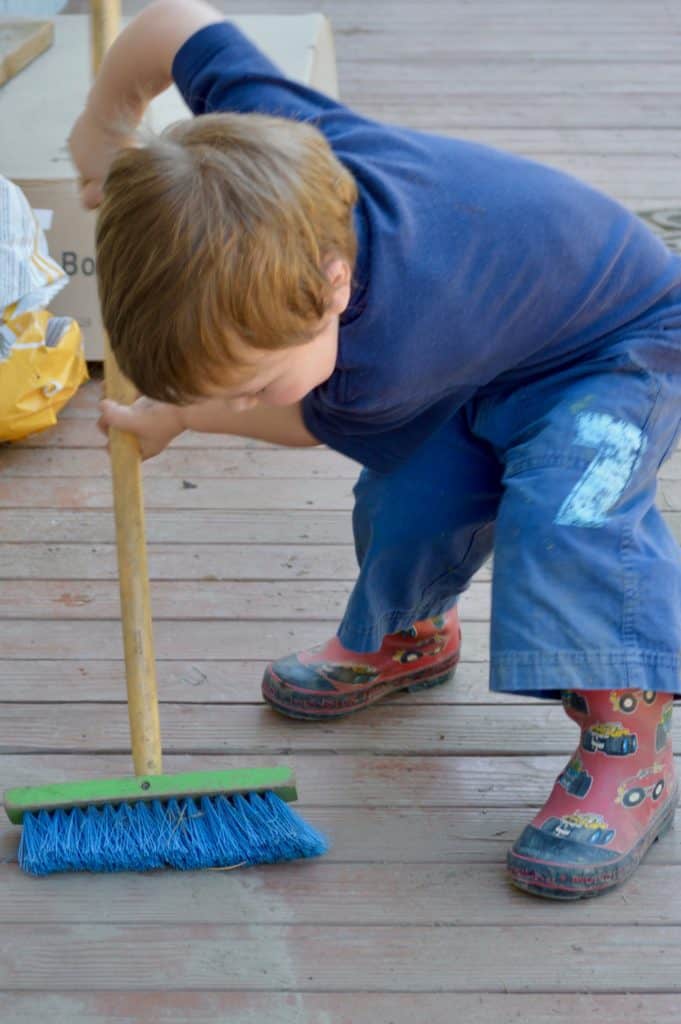
I didn’t have to say a word, because experience said it all: “This mess is a lot of work to clean up!” “Wow, it looks so nice now! “Maybe I can find a cleaner way to have fun…”
Reason Three: Chores Enrich
Do we pay our kids for chores? No, our kids don’t get paid for doing most household tasks because chores are part of being in a family.
No one pays an adult to do their own laundry, or to wash their own dishes, so it makes sense that kids should start to learn that at a young age. We do have extra chores available for pay, and we encourage children to earn their own money using their creativity.

Household chores are a natural, tangible introduction to the world of finances. A strong work ethic, useful skills, and cooperation become assets in building a life for themselves and their loved ones.
A parent’s attitude towards kids and chores
Chores have the potential to draw you closer to your children, but the process may require you to examine some of your assumptions and reconsider the way housework was handled in your childhood. Here are three specific ways that chores have blessed my relationship with my kids.
Example
Question for you: did you make your bed today? Your approach and attitude to work is continually observed by your children. However, don’t beat yourself up, just read this truth out loud:
I can’t be perfect but I can be mature.
@dinkumtribe Here are a few tips on how to teach a 7 year old to make their bed: 1. Start by making the bed yourself. Show your child how you do it, and explain each step as you go. 2. Once your child understands the basic steps, let them try making the bed on their own. Be patient and offer encouragement. 3. If your child gets frustrated, don't give up. Keep practicing, and eventually they'll get the hang of it. Here are some fun ways to make making the bed more enjoyable for your child: *** Make it a game. See who can make the bed the fastest or the neatest.** *** Let your child choose their own bedspread and pillows.** *** Put a sticker chart on the wall and give your child a sticker for every time they make their bed.** Making the bed is a simple task, but it can teach kids valuable life skills. So get your child started today! @DinkumTribe ADHD family travel @DinkumTribe ADHD family travel @DinkumTribe ADHD family travel #makingthebed #kidschores #lifeskillsmatter #lifeskills101 ♬ original sound – DinkumTribe ADHD family travel
The bottom line is that you and I have the responsibility of portraying a healthy work life to our children. Does that mean making your bed everyday? No, but it probably means making your bed most days, and being open to talking about when and why you sometimes choose not to.
The fact is that there are days when the last thing you should do is work—sick days, Christmas, your birthday—and your children can learn from those times too.
That said, nothing will motivate your children to consistently work well like your good example. Tell them the value of a well-made bed and show them by making your bed regularly.
Engagement
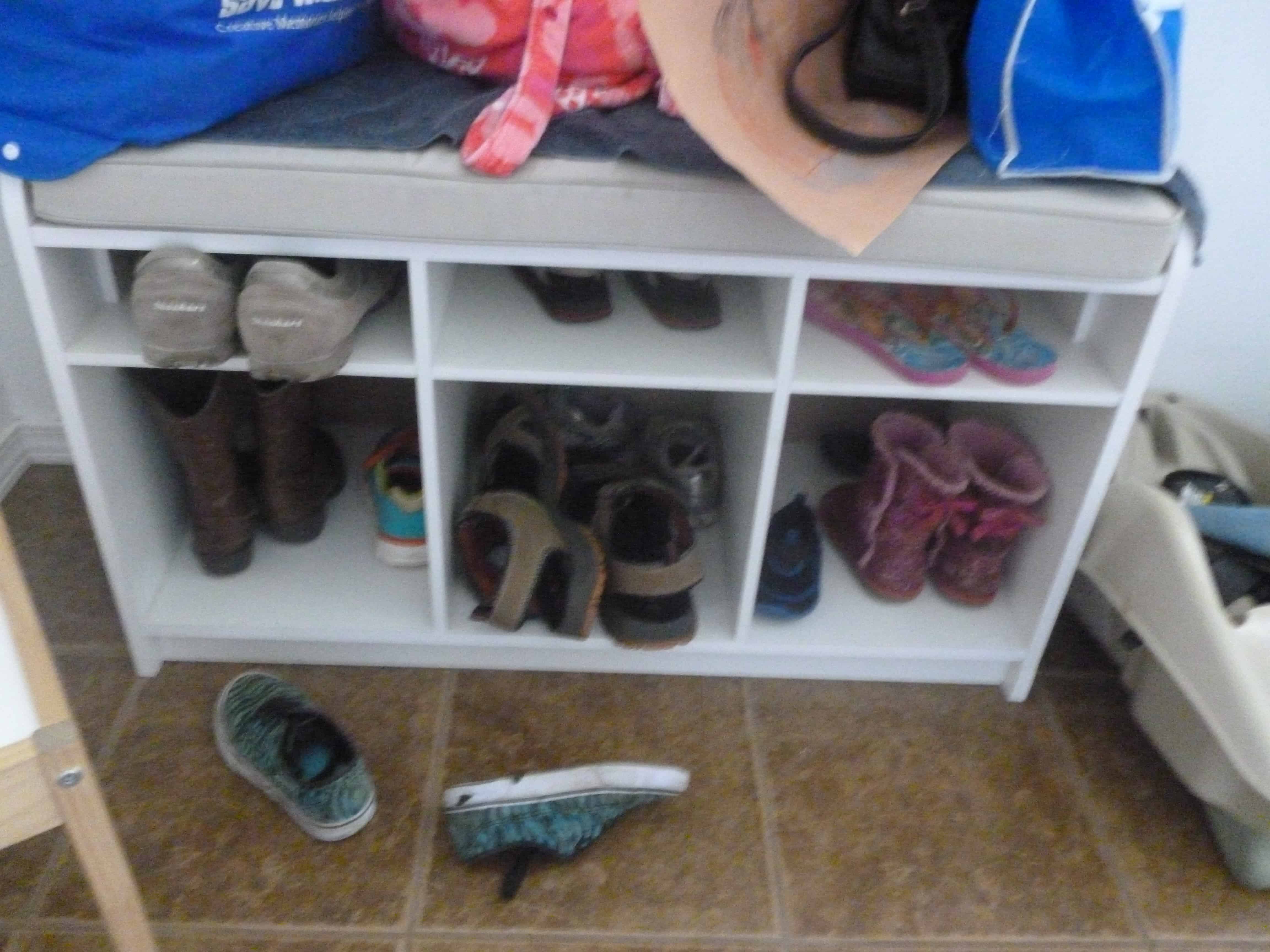
You’ve probably heard the workplace adage:
What gets monitored gets done, and what’s monitored well gets done well.
-some smart guy
Work has an incredible ability to highlight our character defects and challenge us to grow. As your child’s manager you will get firsthand insight into your own strengths and weaknesses as a teacher and manager.
Moreover, the process of training and guiding your child will require significant, consistent investment into them as a person. In short, you cannot assign chores and then absent yourself from the process.
Encouragement
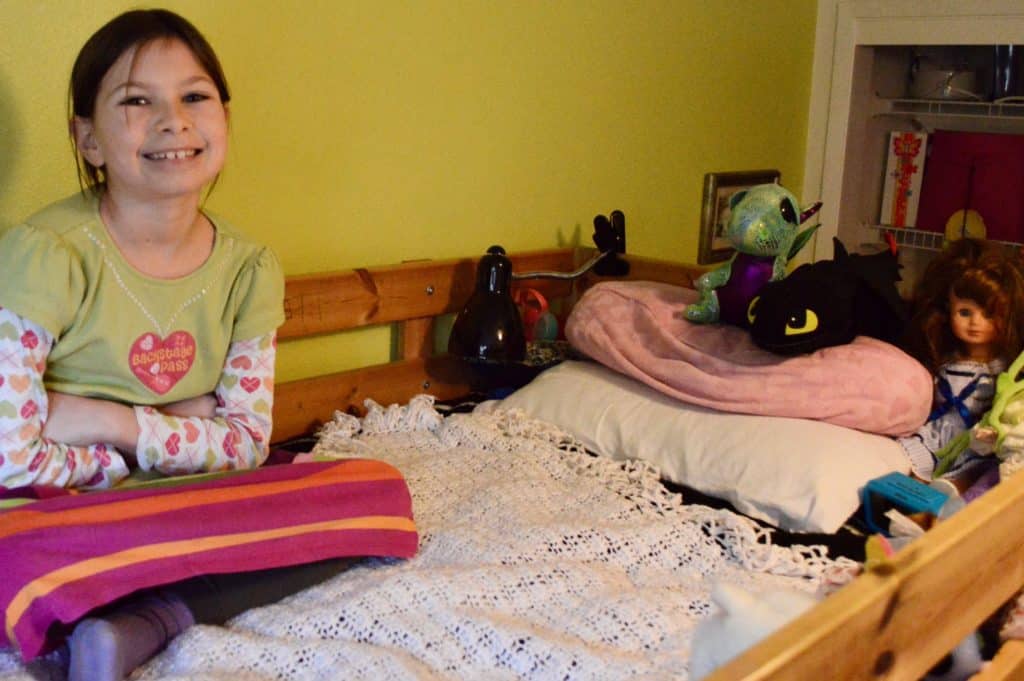
Few longings are as strong as a child’s need for love, approval, and belonging. Household chores furnish us with daily opportunities to praise and encourage our children for their character, abilities, and efforts.
In fact, new chores provide an excellent opportunity to celebrate a child’s growth. We can smile and say:
“You’ve mastered doing dishes, so how would you like to learn how to operate the dishwasher?”
“You’ve become so dependable. I think you have what it take to make lunch for the family every school day. What do you think?”
@dinkumtribe It took me a long time to get comfortable enough in the kitchen to start teaching my kids these skills, but it has been totally worth it! @dinkumtribe @dinkumtribe @dinkumtribe #oregonfamily #kidsinthekitchen #kitchenskills101 #kidscookingdinner #teachingkidstocook #chefknifeskills #homeschoolersoftiktok #homeschoolkids ♬ Happy Kids
“You’ve completed all of your work early! How would you like to do an extra job to earn some money?”
Children have a natural desire to learn and grow. Loving support supercharges their desire to mature, motivating them to dream and achieve things that would otherwise be out of their reach. You and I have the incredible privilege of participating in this process!
Choose Your Child
I freely admit that training chores has been an enormous challenge. But most of the challenge hasn’t come from my children, but rather from my distorted thinking about work and life.

*Special note about ADHD kids and chores*
My husband and three of our children have ADHD. One of the major challenges our ADHD kids have is accomplishing multi-step tasks, and staying on task.
We’ve found that consistency and clear expectations for chores provides built-in practice and reminders on how to grow in these executive function skills. So being successful at chores has paved the way for our ADHD kids to do better in school as well.

Setting up your family chore system
We recently did a complete chore system overhaul, which we seldom do. Updating our system was desperately needed for a couple of reasons.
We bought a new house in the spring, which has been a huge blessing! We went from 1200 square feet to over 3000 square feet for 8 people, one Labrador, and 3 cats. There’s a lot more to clean (dog and cat hair, anyone?), as well as a different floor plan.

Also, some of our little kids are now old enough to contribute to the household chores in a more substantial way.
Our older children, while more capable, are also busier and have more responsibilities. They needed different chore requirements that would work with their school schedules.
@dinkumtribe Here’s a quick parenting hack to help you if you have a child who struggles to get the room cleaned. @dinkumtribe @dinkumtribe @dinkumtribe #ParentingHack #ParentingTips #ParentingTipsAndHacks #Parenting101 ##CleaningMyKidsRoom##BedroomOrganization##ParentingTeens##ParentingPreteens ♬ Won't You Be My Neighbor? – Mister Rogers
How do you make a chore chart for the whole family?
1. Master chore list
Create a master list of chores that are required for the household to run smoothly. I used the menu and shopping list template on my Mac’s Numbers app to create my own chore chart.
I like it because it comes with a straight list feature on one page and a chart on the other. This makes it easy to move back and forth between them. It also keeps them together for the next time I have to update our family chore system.
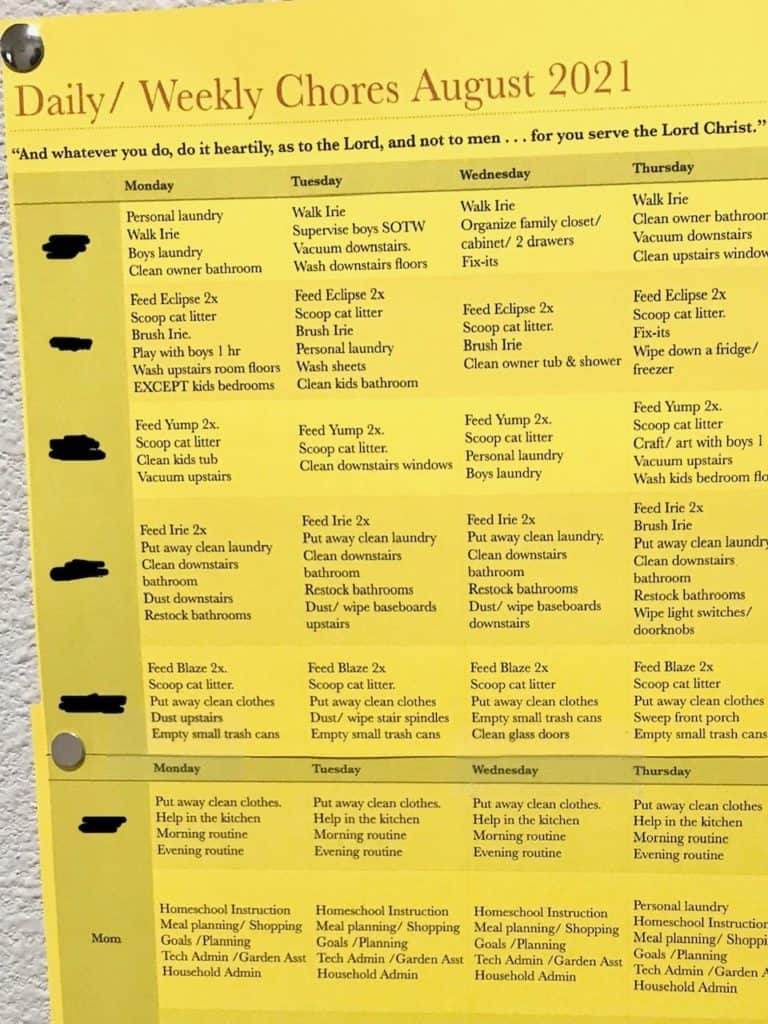
2. Organize the chore types
List general categories (meal cleanup, groceries) as well as specific chores (polish piano). Some tasks may be easily done by one person all at once, others may be better separated into smaller tasks.
3. Include EVERYTHING
Include all adult household responsibilities as well. Kids need to see that everyone takes part in keeping the house running. This is the best way to identify areas where one person is doing more than their fair share and redistribute things more evenly.
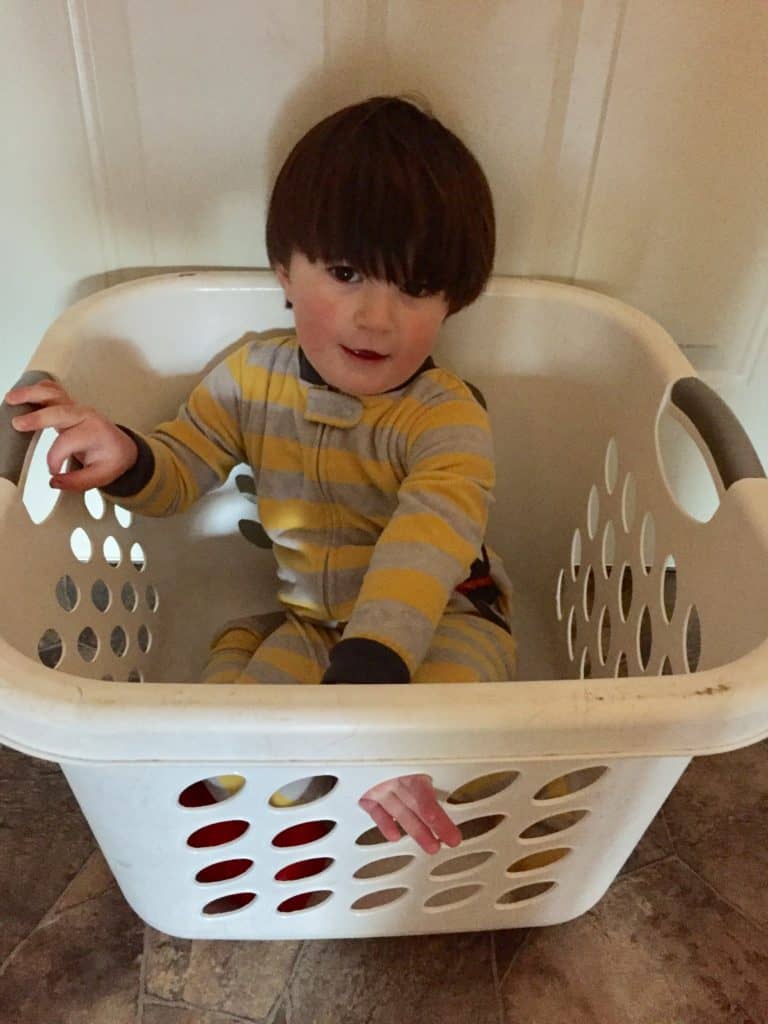
4. What household chores should be done daily? Weekly? As Needed?
This is greatly dependent on how many people are in your house. So you decide how often each chore needs to be addressed: daily, weekly, monthly, as needed. Note that you may not be able to hit every chore as often as you want to!
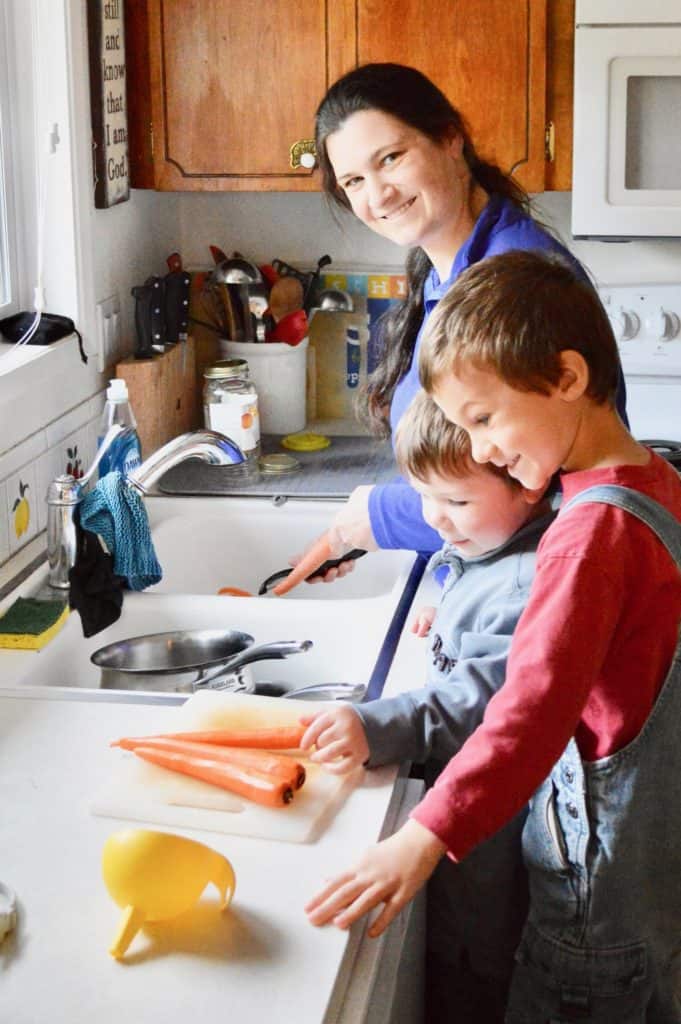
5. Who can do it?
Decide who’s capable of doing each chore based on the child’s age, ability, desire, and schedule. Not everyone can manage a vacuum, nor should little ones be using dangerous chemicals unsupervised. If you need help deciding what a younger child may be capable of doing, search “list of age-appropriate chores” on Pinterest to see what other parents are doing.
@dinkumtribe Making the bed is a great way to teach kids responsibility and it's also a good way to start their day off on the right foot. Here are the steps on how to teach a 4 year old to make their bed: Start by making your bed together. This will help your child see how it's done and it will also give them a chance to practice. Once your child has a good understanding of the steps, let them try making their bed on their own. Be sure to offer help if they need it. Praise your child for their efforts. Even if their bed doesn't look perfect, they're still learning and that's what matters. With a little practice, your child will be making their bed like a pro in no time! @DinkumTribe ADHD family travel @DinkumTribe ADHD family travel @DinkumTribe ADHD family travel #makingthebed #preschoolchores #kidschores #preschoolathome ♬ original sound – DinkumTribe ADHD family travel
6. Gather information
Get feedback from others in household—they may remind you of things you missed, or areas that are lacking.
7. Family meeting
Have a family meeting with everyone. Plan to discuss the need to maintain the house, and everyone’s responsibility to help out.
Ask each person what chore they most prefer, and most despise. Accommodate as many of these requests as possible, but also make it clear that everyone will have to do some things they don’t prefer.
8. Clarify expectations
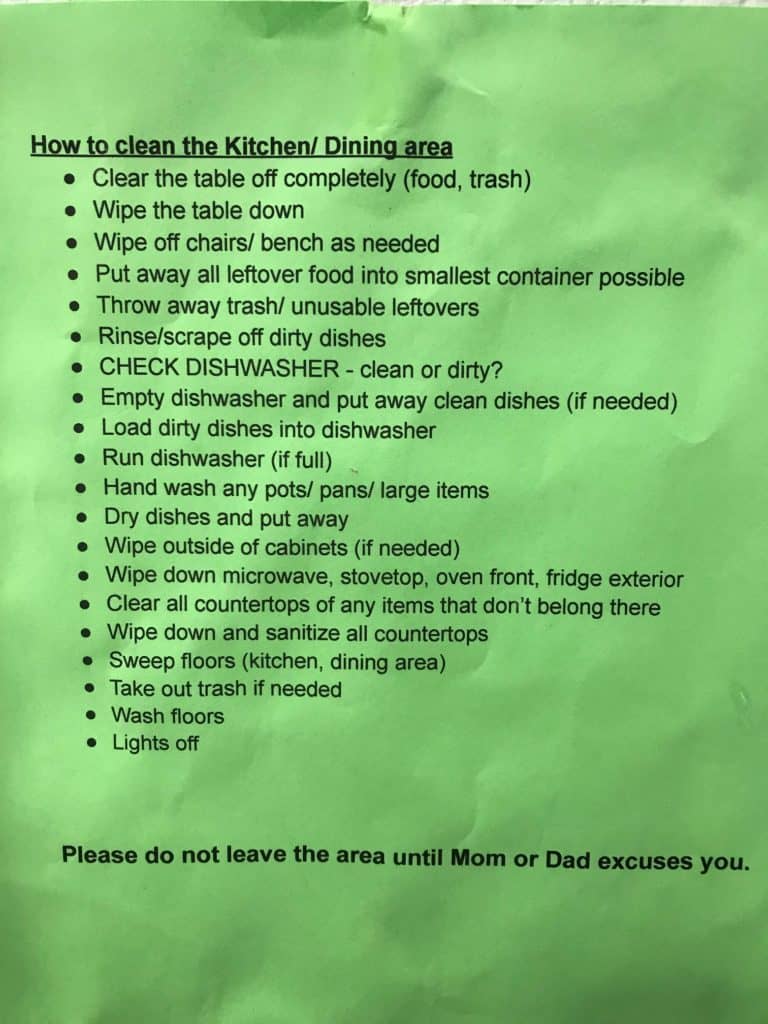
Create lists (and photos if possible) of what an area will look like when the said chore is sufficiently done. Clear expectations are the best way to ensure that everyone is on the same page.
9. Create your family chore chart
Set up the chore chart using a printable template. Then post your chore chart in several locations for easy reference (kitchen, upstairs hallway). Bright colors are an easy way to make it even more visible. I also highly recommend laminating your chore chart or covering it in a page protector.
10. Create personal chore charts
With my younger kids, I often create a visual chore chart for their personal daily tasks. Even a toddler can learn to recognize the symbols for picking up dirty clothes, making their bed (simply) and so on. This helps them develop good habits from an early age.
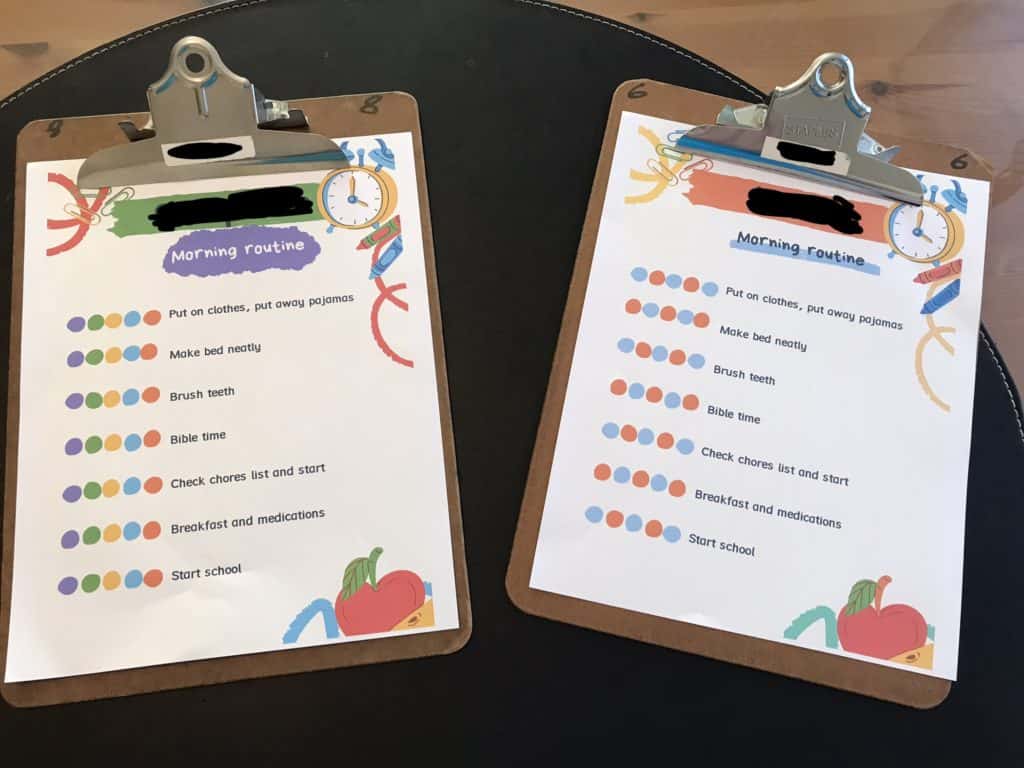
Once you have gotten yourself organized and encouraged your family’s buy-in, it’s time to get the chores going. Here are some tips and thoughts on how to make the implementation and training go as smoothly as possible.
Dedicate Time
-Plan at least one week when the focus will be on training your whole family on the new chore chart system. Block off several weeks if children are young or you have a lot going on that cannot be shifted to another time.

-During training weeks plan to spend a significant portion of your time correcting and checking chore work. This saves time and energy later!
-Cut back on other activities/ transitions where possible during the chore training time.
-I like to start an updated system before the school year starts (August). Choose a time that works best for your family.
-When you’re just starting a new chore chart, it’s often easier to chose a specific time to be “chore time” for the whole family. Otherwise I’ve noticed that kids tend to get lost playing and forget to finish!
Make it easier
Be kind to yourself, parents! On the weeks when you are teaching a new chore system, it’s a good idea to make mealtimes simpler. Order pizza, or have a crockpot meal, or use paper plates, etc.

You will be tired at the end of a busy day helping kids learn, so give yourself the support you need to see it through. A simplified menu and paper goods instead of dishes can go a long way in making things happen over the short term.
How often should you make changes?
How often should you revise the chore system? No sooner than every six months, but what works best is every year or eighteen months. This gives everyone a chance to thoroughly learn the jobs, while also saving time for parents.
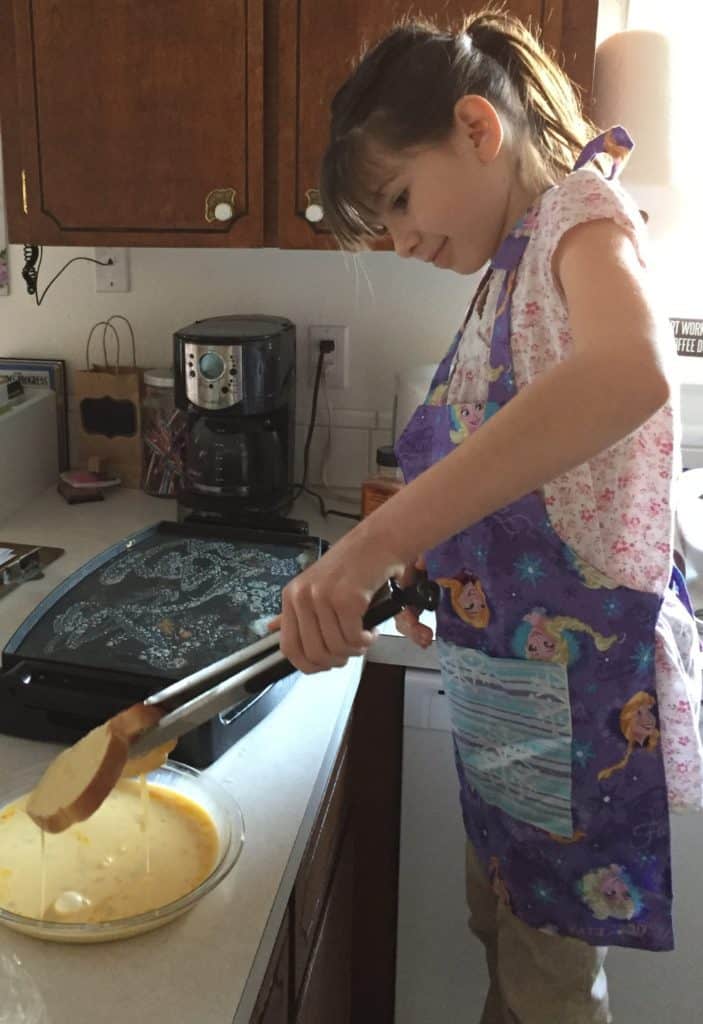
Keep in mind that you want kids to eventually learn all aspects of running a household, so it’s good to switch it up each year or two.
Kids’ maturity and abilities change so quickly over the course of six months or a year. We have some safe, age-appropriate chores that we will give to a young child. We have other chores that we assign based on interest or age.
As children demonstrate maturity or ability, we want to give them different and appropriate chores that match those abilities and build on them.
Awesome New Chores App!
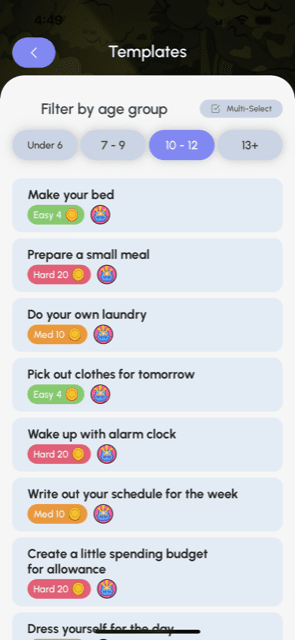
One of our new favorite tools to help manage chores in our busy household is the Joon app! It’s an app specifically designed for young kids with ADHD, but it works well with any kid ages 6 up to about age 14.
The Joon app has made consistent follow-through on chores and homeschool so much easier and fun for both parents and kids. It’s a total game changer for tracking chores in our large family! Read our full Joon review here.
Final thoughts about kids and chores
There’s no such thing as a perfect chore chart, or the perfect solution to your family chores. If you’re short on time, I’d highly recommend searching Pinterest for a free chore chart or a free printable chore chart template, and just making minor adjustments to it.
Here’s some links to great chore chart ideas to get you started:
Sample Weekly Homeschool and Chore Chart
I’ve found that the best chore charts are simple enough to adjust easily when life circumstances change.
I like printing a basic Numbers or Google Sheets document on brightly colored paper (or highlighting each person’s area in a different color).
The most important thing is to make it work for you and your family. Your family chore chart won’t look quite like anyone else’s, just like your family isn’t the same as anyone else’s.
We offer our best products as freebies to our Patreon subscribers. Sign up today to get access to exclusive content and even more free printables!
©️Copyright Jennifer D. Warren and Brian A. Warren 2023
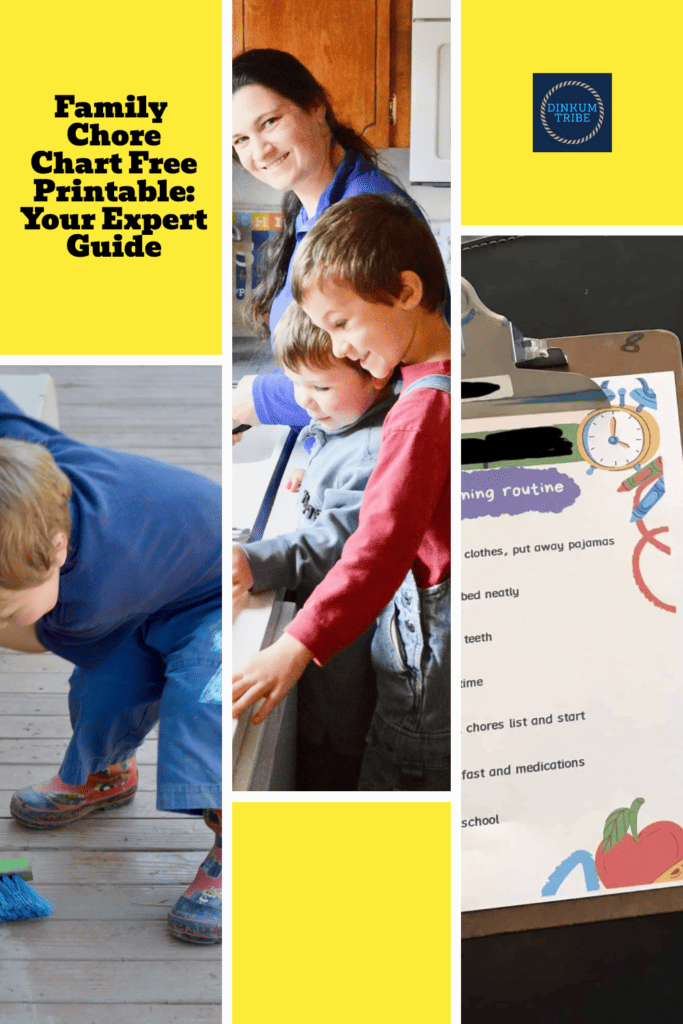
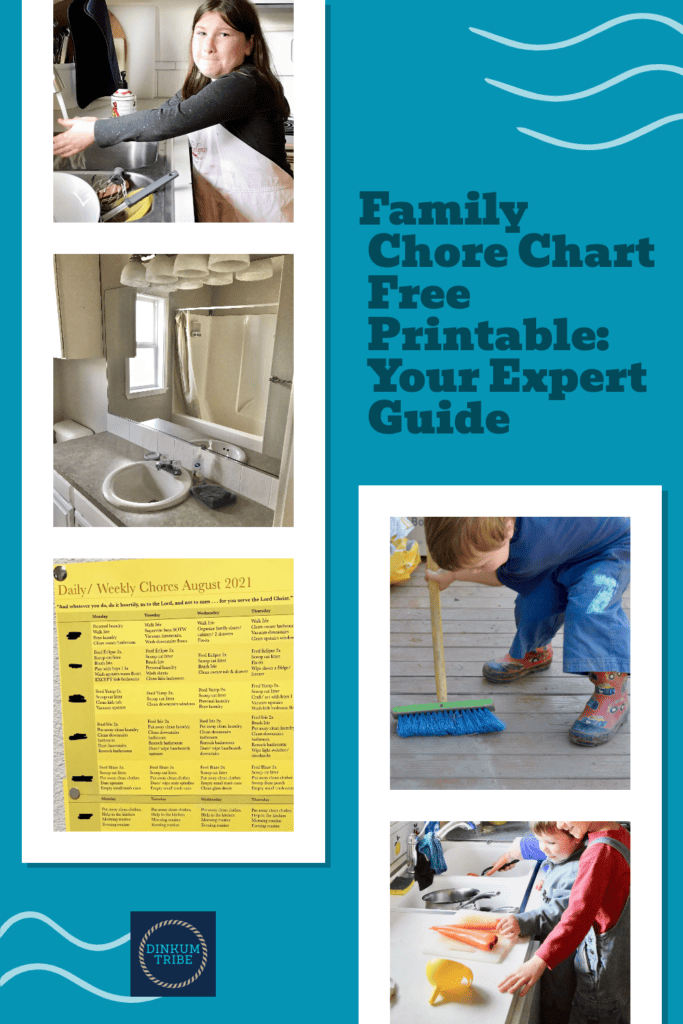




Comments